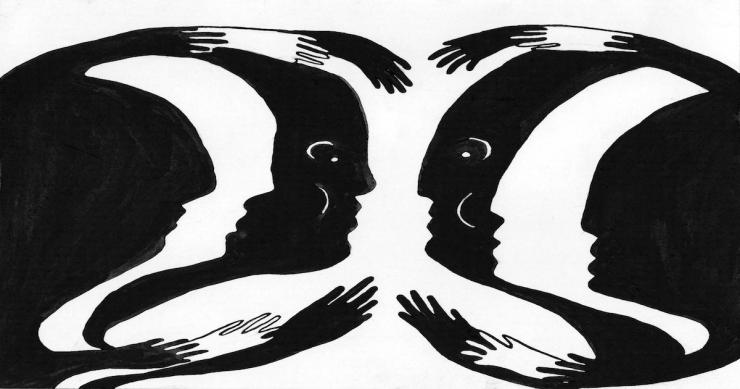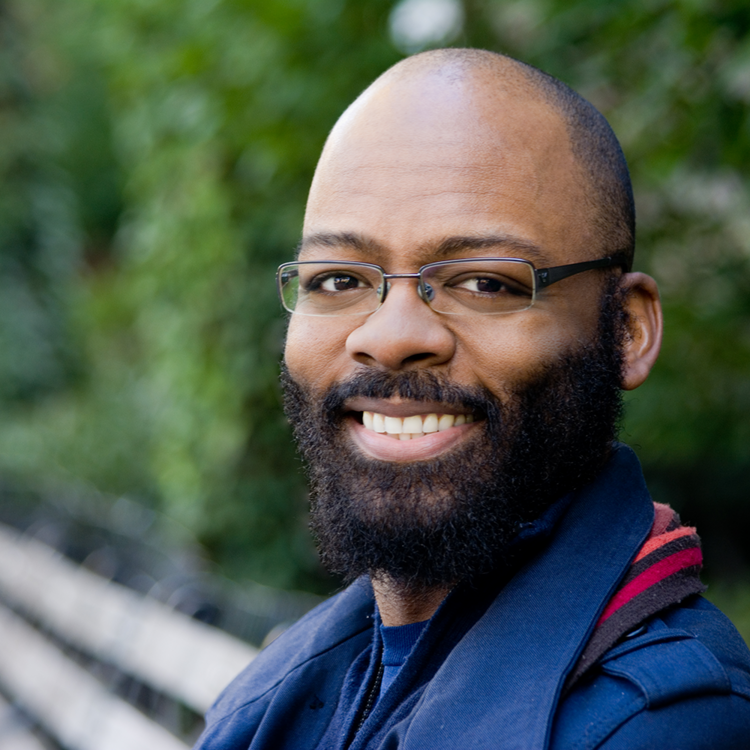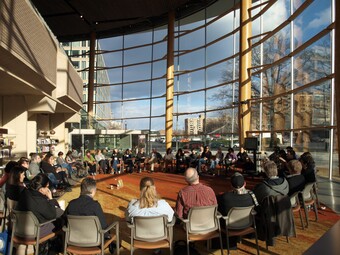A Manifesto for the 21st Century Literary Office
The following manifesto was presented as part of the American Voices New Play Institute's 21st Century Literary Office Convening that took place February 24 & 25, 2012 at Arena Stage in Washington, DC. Click here to watch a video of all five manifestos presented to the convening.

The future is a wish. What are your wildest dreams for the literary office of the future?
1. In the literary office of the future, isolation and solitude are abolished. No one is alone.
2. In the literary office of the future, community and collaboration are emphasized.
3. The literary office of the future will be a joint venture that connects several institutions either by region or artistic sensibilities in an effort to share resources and work and minimize duplication of efforts. The literary office will be a system. One way that this system might work is that literary managers from one region work together to review material that is submitted for consideration. At present, a single play may be submitted to multiple theaters, say twenty different institutions. In this case, twenty or so different literary associates are all reading and evaluating the same play. In this type of network, perhaps there is a database that tracks the submission of works and each play is evaluated by a minimum of two individuals (instead of twenty) who then report back to the whole group. As a part of the evaluation process, in such a network it is crucial that literary associates have a understanding of what types of works will satisfy other institutions, and script reviewers will recommend plays or playwrights to peer institutions. In this way also, the literary office becomes and exists within a larger community that serves both specific institutions as well as a larger field.
4. In the literary office of the future, gates will be abolished. At present scripts, artists, ideas are met by a series of gates, which they will either pass through or at which they are halted. When gateways and such obstacles are eliminated, the literary office will cease to be a destination. Rather, like being an artist, it will evolve into a way of being in the world, a vast network, a series of relationships. And in this way, the literary office becomes a—*
Comfort and safety will be abolished. Danger and discomfort will be the primary trait of the theater of the future.
5. Text is not privileged over production and spectacle and scripts are evaluated as much for their theatrical potential as for their literary merit.
6. The line between literary office and artistic associates will be abolished. In the future, the literary office will not just be a place for dramaturgs and literary (wo)managers. There is a hierarchal crisis in designating directors and writers as artistic associates (or such titles) while simultaneously having the dramaturgs or literary associate as a separate thing. In the future, this gulf is bridged. As such, directors and playwrights and others engage with the literary office in these conversations pertaining to literary issues including season planning.
7. In the literary office of the future the focus will shift from new play development to playwright development. Under such conditions, writers enter into relationships with institutions that are not based solely on one particular play but rather on an investment in the writer. Also, since the literary office is now a consortium of multiple institutions working together then playwright development would occur as collaborations and conversations between these various institutions.
What shall we expect of the theater of the future?
1. In the theater of the future, ambivalence will be abolished. August Strindberg in his 1888 “Preface to Miss Julie” wrote: "If my tragedy depresses many people, it is their own fault." Substitute the word “depresses” for any number of words including “angers,” “excites,” “surprises” and this will be a characteristic of all future theater, that will do something to audiences. However, rather than distribute responsibility for such feelings totally onto the audience member, the work itself will share in accountability. In this way also, there is an acknowledged conversation/ exchange between work onstage and audiences.
2. Comfort and safety will be abolished. Danger and discomfort will be the primary trait of the theater of the future. Director and playwright Robert O’Hara once described his theater as a place where everyone is welcomed and no one is safe. Similarly, Irene Lewis, the former Artistic Director of Centerstage in Baltimore, advocated that in the theater the only comfort available should be provided by the seats and so in terms of the work onstage we should be challenging people’s sense of comfort.
3. In the theater of the future love will make as deep an impression as hurt. Lately, I've been wondering if a person's hurt makes a deeper imprint than their love. Harm and abuse become phantoms ever present in shadows and in the land between awake and sleep. A kiss is rarely as shocking as a slap. Maybe that is just the stuff that is wandering around in my mind.**
Maybe this is just the stuff that is wandering around in my mind.
______________________________
* I dreamed this manifesto in the truest sense. I went to sleep with nothing written down and woke on the morning of the convening and poured these thoughts onto the page. I have left this unfinished thought in this published version since it was unfinished at the time that I delivered this manifesto. I see this thought fragment as a marker of the surreality of this written work, especially in accordance to André Breton’s assertions in the First and Second Surrealist Manifestos (1924 & 1929).
** In “36 Assumptions About Writing Plays” Jose Rivera declares: "13. Invest something truly personal in each of your characters, even if it’s something of your worst self." I have taken this advice to heart, and in all of my writing I employ this tactic of including something of myself. I do not always make a point of highlighting what is personal; however, at the convening I was asked a few times about this statement. This is just a tiny peak into the world of my mind right now; that’s all I’ll say. Thanks for “listening.”






Comments
The article is just the start of the conversation—we want to know what you think about this subject, too! HowlRound is a space for knowledge-sharing, and we welcome spirited, thoughtful, and on-topic dialogue. Find our full comments policy here
This excited me and really intrigued me. As Head of Acting in a professional training program I'm always reading plays and interested in material for a diverse population in whom I want to instill the notions you speak about. There could be an army of readers. Many of us with multi faceted multi dimensional careers. We might contribute and benefit from a collaborative literary army.
Hi Otis,
Love the phrase "love will make as deep an impression as hurt."